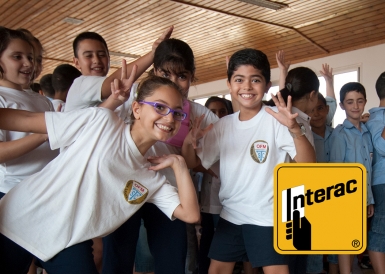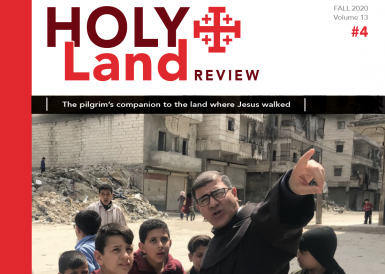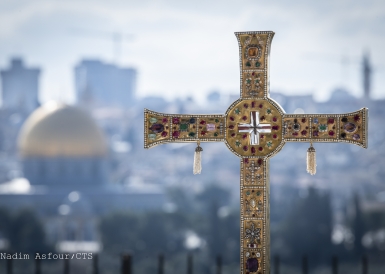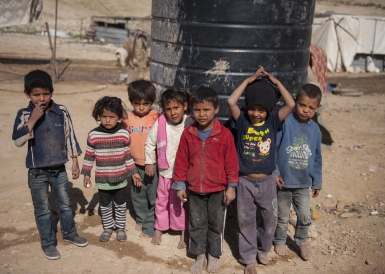On June 6, 2018, Marie-Armelle Beaulieu, managing editor of Terre Sainte magazine, was interviewed by Stephanie Dupasquier of France's KTO TV channel about the present situation and the future of Christians in the Holy Land. The following is a translation of portions of that conversation. The French video can be seen below:
Tell us what Christians are going through in the Holy Land. We only hear about it in dramatic situations. Tell us, do we have a slightly distorted perception?
Yes indeed, we do have a distorted perception. We are dealing with narratives on the part of Israelis and Palestinians that are distorted. So, if we are dealing with distorted information, and then these are put it into a one-minute or a minute-and-a-half format for audiovisual or television, it becomes very difficult to understand.
Do you feel that the situation today is getting worse?
I've known this country for 32 years and have resided there for the past 18 years; and yes, the situation continues to deteriorate. That doesn't mean there's more violence. ... But precisely what is deteriorating are the chances for peace, as the peoples hurt each other -- the Jewish Israelis on one side and the Palestinian Christians and Muslims on the other. And so, to the extent that these two peoples wound each other, ... well, the means to attain peace seem smaller, more distant, more obscure ... A colleague from Le Monde speaks of this as not being a process but a "regress" of peace – of the peace that was established in the 1990s with the Oslo Accords ...
Can you map out the situation for Christians?
Christians make up 1.5 percent of the total population of the state of Israel and the Palestinian territories. What does that mean?
That means that in the state of Israel there are 130,000 Palestinian Christians, that is Arab Christians. They are amid 7,000,000 Jews and 1,800,000 Muslims who have Israeli nationality. One hundred and thirty thousand Arab Christians from thirteen different Christian denominations have to contend with these two groups.
And then, in the Palestinian territories, in the Gaza strip, we have 1,000 Christians living among 1,900,000 Muslims. And in the remaining Palestinian territories, with its population of 3,000,000 inhabitants, there are 50,000 Christians.
This is really a Christian minority with a profusion of Christian denominations. It is a very rich Church, very varied, very beautiful; but the situation is one of a very small local Christian presence in the Holy Land.
Returning to the discussion of a deteriorating situation and of lesser likelihood for peace, given the present situation, the interviewer asks …
Let’s return to the subject of tensions. Tell us what set things going?
Undoubtedly it is the United States’ recognition of Jerusalem as the capital of the state of Israel. ... It ignited [the present situation] because it is against international law. That is to say, the United States ignored international law by making this unilateral declaration … well, it is not entirely unilateral, since in fact it follows Israeli policy. But it's against the law, in its historical context.
In 1947, when the United Nations considered dividing up historic Palestine, one part was to return to the Hebrew state, which gave birth to the state of Israel; and the other part was to become a Palestinian state. The Palestinians, however, from their point of view, did not appreciate being robbed of half of their land. Therefore, they didn’t look at building a state but fought against the part that was establishing itself as a Jewish state. And, at the time of this dividing-up, the status of the city of Jerusalem was to be discussed once peace was established. Seventy years later, there is no peace; thus, the status of Jerusalem was never discussed. For the United Nations, Jerusalem was meant to be a city governed by international law.
There was also an amazing, and unprecedented, event: the closure of the Holy Sepulchre. ... The churches that closed the Holy Sepulchre were protesting against Israel; it was a situation that lasted for three days. The reasons for this act [were explained] ... in this report from Terra Santa News ...
The doors of the Holy Sepulchre were closed until further notice on the morning of Sunday, February 25. It is a protest shared by the three communities responsible for the basilica: the Greek Orthodox Patriarchate, the Custody of the Holy Land, and the Armenian Patriarchate. At issue is the latest bill proposed by the Israeli government on church property, as well as the recent tax measures proposed by the municipality of Jerusalem. ... The measures … are seen as a serious violation of the co-existing status and as an attempt to weaken the Christian presence in the Holy City. Recently this systematic and offensive campaign reached an unprecedented level when the municipality of Jerusalem issued outrageous tax collection notices and orders to seize the goods, property, and bank accounts of the church in retaliation for a so-called local tax debt.
So is the goal to chip away at the land, take in some money? What's the point, actually?
This is difficult to answer because we shouldn’t answer too categorically for the state of Israel. But the fact is it prevents churches from functioning. The churches supplement numerous cultural and social works that the state does not care about because the state of Israel is a Jewish state for Jews. So what happens when you're not a Jew? If the state disengages from non-Jewish populations, someone has to take care of them, and that is what Christians do. There are definitely a number of Israeli Jews today who are not happy that Christians make up for this lack, since it means that they can maintain a non-Jewish presence in a land reserved for Jews.
But, be careful: it is not all Israelis, it is not all Jews either in Israel or outside Israel [who think this way]. But this pressure exists; it’s strong. ... These two attacks on the Church alerted all the churches sufficiently so that, on their behalf, the Orthodox Greeks, and Franciscans, in the name of the Roman Catholic Church, and the Apostolic Armenians ... These are the three custodians of the Holy Sepulchre ... Yes, indeed, they make up the status quo which regulates relations between the churches and the state of Israel.
What's it been like since then?
Well, the situation is frozen. Israel has not given up on its project, but it has said that it should be discussed. More than ever a discussion is needed so that there can be an agreement between the state of Israel and the Holy See to find a solution regarding taxes, assessments, lands, goods, and the recognition of the churches’ fiscal rights within the State of Israel. ... The time has now come for diplomacy, the time has come for an inter-ministerial commission, with representatives from Israel and from the churches, to meet to find a solution.
What are you hearing from Christians in the street?
You know the Christians in Israel and Palestine are primarily Palestinians, and they react with the same gut reaction as the average Palestinian because this is their land, their culture, it is their families that are deprived. So they don’t react first of all as Christians possessing an extraordinary possibility of bridging the differences any more than others. The Christian is, first of all, a Palestinian; and he is first of all a Palestinian who, from his viewpoint, lives under occupation -- in the territories, and in the complicated status of the city of Jerusalem. ... You are a Christian because you are not Jewish, because you are not a Muslim. And I see a new generation of Christians, from about the age of 18 but also up to forty years of age, who also ask that the Church not simply be a distributor of sacraments, but that it provide them with strong Christian convictions, so they have the strength to face their reality. The dream has stopped; peace is not going to happen tomorrow ... There are young Christians in associations or in professions - lawyers, legal experts, doctors – who are standing up so they can have a Christian life. They are standing tall, right in the middle of society.
... These [Christians] are the ones who have stayed, they come from all social classes.
... [For example, there is] a young Palestinian Greek Catholic, Nizar, who is in the process of establishing a Christian magazine. It’s a Christian magazine that will talk about culture and about history freed of propaganda. And he also wants to provide information so that young, and less young, Christians can reflect on the situation and discern how to live their own lives: “I'm staying, but why? I want to leave, but why? I am asked by the State of Israel to do my military service inside this state, but I am Palestinian. I'm going to do it, or I'm not going to do it; but on what criteria?” Well, the fact that this newspaper is about to be born is a sign of hope because, in fact, it will be born, because we know that it is wanted, because Christians are waiting for tools to discern their lives.
And then there is a spiritual support, a very concrete support that takes place on the spot, especially with the Franciscans, who have obviously been present for a very long time in the Holy Land, for 800 years. They oversee [the Christian community], they protect the holy places, including the Holy Sepulchre. They also help Christians to stay in Jerusalem, as we see in a documentary [that was prepared by the Christian Media Centre]:
Ettore is employed by the Custody. His work is to restore the Franciscan’s hereditary real estate to house the city’s Christians ... because the community is experiencing a real haemorrhage. Between political problems and the economic crisis, many Christians choose to emigrate. Half a century ago, they represented 20% of the population. Today, they are less than 2%.
From the beginning, the Franciscans understood that they had to help Christians stay here. ... it has always been difficult for Christians to live as a minority amid such a conflict.
In addition to the housing problems, there is the economic crisis. Without employment, many families can no longer afford to pay for their apartments. And then, in Jerusalem, the price hike is even higher than elsewhere: a 100-square-metre apartment costs about 2,000 euros a month. Families housed by the Franciscans will pay less than 10 euros each month.
Is there is a lot of help like that, material help, for Christian families?
Absolutely. In general, we only see the tip of the iceberg when it comes to the churches in the Holy Land -- and Franciscans, in particular – they are at the holy sites, guardians of the holy places. But we don't see the submerged part of the iceberg, which is always the most important. This is where they are involved in social works, in educational works, in health care, and then in very practical works, such as providing their own real estate to house Christians in the Holy Land. ... There is a collection every year on Good Friday, the so-called collection for holy places, but it is not just for holy places; it is for the Christian communities, for all Christians who remain, not just Catholics. All Christians who can be helped, are helped, mostly by the Franciscans; that's a big part of their work.
We are also going to talk about the Christians on the Palestinian side, especially in Gaza, where, as you said, there are around 2,000 and, where, of course Gaza, as seen from the West, is a land of suffering ... But there is, nevertheless, a Christian community that has been there since the days of the Desert Fathers, living alongside the Muslims.
The Christian Middle East has lived with Islam and in the midst of Islam for 1400 years; and when I say “with it”, I mean it has the same culture. And so, effectively, they are the first to know the limits that can be encountered with Islam, and also to know the bridges that can be made with their Muslim neighbours. There’s no doubt about that. Now this Christian community in Gaza – they say there are now about 1,000 Orthodox -- is a drop in the bucket among 1,900,000 people. And in Gaza, the community suffers the same as all the other Gazans; and it also suffers from the way Gaza is described. We only see Gaza as a hotbed of terrorists. Today, it is mainly a population that revolts every Friday; who wants to walk to the security barrier – presently and for the last two months every Friday -- because it refuses to die in silence.
Gaza has one of the densest populations in the world, with more than 5,000 inhabitants per square kilometre. But there are only 4 to 5 hours of electricity per day, 4 to 5 hours of water service every 5 days, drinking water only one in five days. It is a human catastrophe. And half of the population is under 18 years of age. This is what the Christians of Gaza live on a daily basis, along with their differences of being Christian [in a Muslim area]. There is no persecution of Christians in Gaza.
There may be pressures depending on the level of education of the families with whom they are neighbours, etc., but there is no systematic persecution; not at all.
Is there, is there any hope? What are the necessary conditions for advancing peace?
The first hope is in Christ because this is the land that the Lord has chosen -- so we cannot give up hope for this land. He chose it, he has a plan for it. I think that the plan of Christians, Jews, and Muslims for living in the Holy Land is, and will certainly be, the prototype for Christians, Jews and Muslims to live together throughout the rest of the world.
... On the short term, there is no peace process in operation, and I think that, for a true peace process to restart, Israelis and Palestinians will have to learn mutually to respect their historical wounds. ... That means Palestinians must learn to understand ... the historic suffering of the Jewish people from millennia of persecution, and with the Holocaust in the background. The Palestinians need to understand this in the same way that the Israelis are going to have to understand the Palestinians wounds -- losing their land, having to emigrate in masses, being driven from their homes, losing their dream, and being reduced today by settlers somewhat to the state of the First Nations in 19th century America. When there is a mutual recognition of this suffering, then we will find the possible political solutions.



